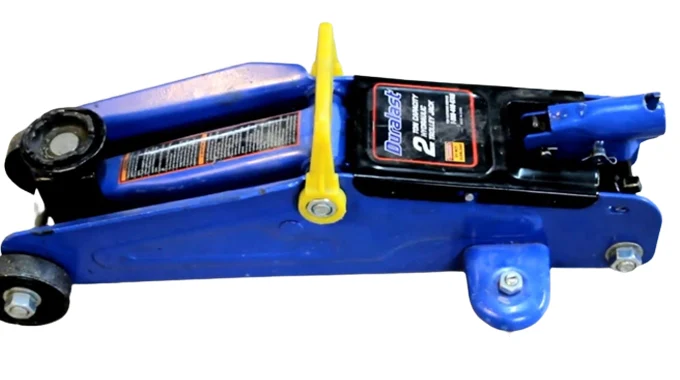Last Updated on April 20, 2023
Have you ever put your floor jack under your car, only to have it slowly sink down as you’re trying to raise the vehicle? It’s a disappointing experience, and it can be unsafe if the jack fails while you’re working.
Not only do you have to stop what you’re doing and find a new way to complete the task at hand, but you also have to handle the cleanup of the hydraulic fluid that leaks. So it’s important to understand why the floor jack is leaking down and how you can fix the problem.
Low fluid pressure is the most common reason a floor jack leaks. There are also several other potential causes of leaking down the jack. Below, we’ll explain the reasons for each so that you can troubleshoot the issue.
Why Does My Floor Jack Leak Down and How Can I Fix It?
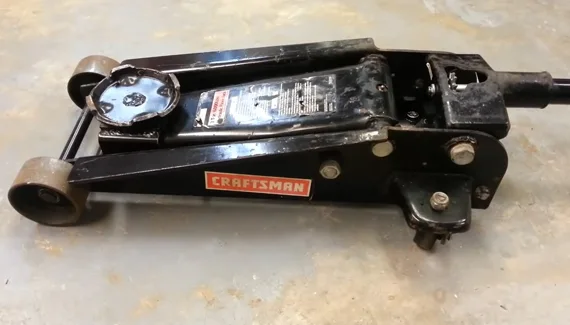
The floor jack is not always the most reliable of tools if you have ever used one. Often, they will leak down over time, leaving you stuck with a heavy load. There are a few reasons why this may happen.
If your floor jack is leaking down, it’s likely due to one of the following issues:
- Overloading the jack
- Low fluid pressure
- Improperly installed check valve
- Worn or damaged seals
- Faulty air pump
- Hydraulic fluid contamination
- Lubrication issues
- Damaged piston seal
Let’s take a closer look at each of these potential causes and how you can fix them.
Overloading the Jack
Overloading the jack is one of the primary reasons why it would start to leak down. You see, every floor jack has a limit as to how much weight it can carry. When you try to exceed that, the jack will start to struggle. This practice not only prevents you from lifting a vehicle correctly, but it may also damage the jack internally.
In some cases, the damage caused by overloading may be irreparable. If you want to fix a floor jack that leaks down when in use, always ensure that the load’s weight is within the specified range.
Once you’ve determined that the weight is within the limits of the jack, make sure that the load is evenly distributed. If the load is uneven or unbalanced, it could suddenly shift, causing the jack to collapse. You should stop doing this immediately if you have been doing it.
Low Fluid Pressure
It’s likely that if your floor jack leaks and you can’t figure out why the problem is likely due to low fluid pressure. This can be caused by several factors, but the most common culprit is simply insufficient hydraulic oil in the jack.
Without enough oil, the pump cannot build up enough pressure to raise the load, and hydraulic fluid will leak out of the seals. Ensure your floor jack always has oil up to the oil line and not too far above or below.
Regularly check the oil level and top it off as necessary. Also, if your floor jack has been sitting for a while, the oil may have degraded and lost its ability to create pressure. You’ll need to replace the oil in this case.
Improperly Installed Check Valve
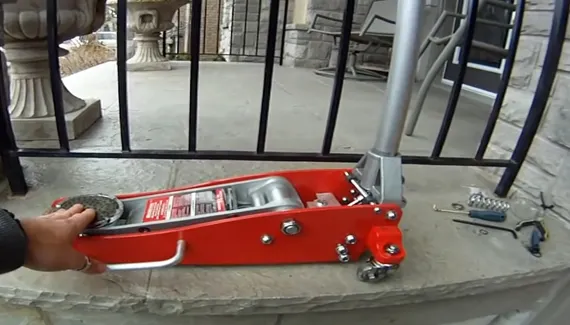
If your floor jack leaks down, it’s likely due to an improperly installed check valve. The check valve is responsible for keeping hydraulic fluid from flowing back into the pump when the jack is not in use. Incorrectly installed check valves can leak hydraulic fluid out of the jack, causing it to lose pressure and eventually fail.
To fix this problem, simply remove the check valve and reinstall it according to the manufacturer’s instructions. With the check valve properly installed, the floor jack shouldn’t leak anymore and should be able to provide years of reliable service.
Worn or Damaged Seals
The most common cause of a leaky floor jack is worn or damaged seals. The seals are responsible for keeping oil in the jack, and if they become damaged, the oil will begin to leak out. When this happens, you’ll need to replace the seals. The process is relatively straightforward, and you can do it yourself.
The first step is to identify the type of seal that you need. Two common types of seals are used in floor jacks:
- O-rings
- lip seals
Once you’ve identified the type of seal you need, the next step is to remove the old seal. This is usually done by prying it out with a flathead screwdriver. Once the old seal is removed, simply install the new one in its place. Ensure the new seal is seated correctly, and then reassemble your jack.
Faulty air circulation
If you find that the floor jack leaks down, one possibility is that there is air trapped in the jack’s hydraulics. This can happen if the jack is not used for a while, and the air has time to seep in. The air trapped in the jack can be released to fix this problem.
You can do this by opening the jack release valve and letting the air out. If this does not solve the problem, you may need to replace the seal on the piston. This is a more difficult repair, but it can be done if you are familiar with hydraulic systems. Once you have replaced the seal, your floor jack should no longer leak down.
Hydraulic fluid contamination
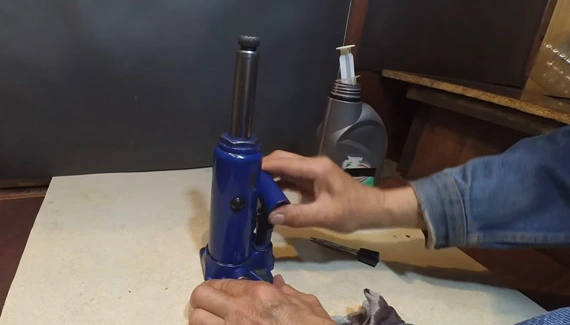
One of the most common problems with floor jacks is that they start to leak down, losing their hydraulic fluid over time. This may occur for various reasons, but fluid contamination is most likely the cause. Hydraulic fluid is a very stable substance, but it can be degraded by water and other contaminants.
When this happens, the fluid becomes less effective at lubricating the system and starts to break down, leading to leaks. The best way to prevent this is to regularly check the fluid level in your jack and top it up as needed.
You should also take care to avoid using contaminated fluids, such as those from puddles or other sources of water. If your jack does start to leak, you can try replacing the seals or installing a new hydraulic pump. The jack may need to be replaced if the problem persists.
Lubrication Issues
Floor jacks that leak down could be due to a lack of lubrication. The hydraulic fluid in the jack needs to be regularly replaced to ensure that it is properly lubricating the system. Over time, the fluid will become contaminated and will need to be flushed out.
You can do this by removing the plug at the bottom of the jack and draining the old fluid. Once the jack is empty, you can add new hydraulic fluid. After adding the new fluid, be sure that nothing is blocking the jacks and that everything is seated correctly. Be sure to check that everything is working properly as well.
Damaged Piston Seal
If the piston seal is damaged, it can cause the jack to leak down, making it difficult to raise the load. Sometimes, the damage may be due to wear and tear, but it can also be caused by dirt or debris that has gotten into the jack. The piston seal keeps the cylinder from leaking hydraulic fluid.
When the seal is damaged, hydraulic fluid will begin to seep out, causing the jack to lose its lifting power. You can fix a damaged piston seal in a few ways. One option is to replace the seal entirely. This can be done by removing the old seal and installing a new one in its place.
There is also the option of repairing the existing seal. Filling in cracks or gaps can be accomplished by using a sealant. Whatever method you choose, make sure the repair is completed properly so the floor jack can continue to function efficiently for years to come.
What Happens If You Floor Jack Leaks?
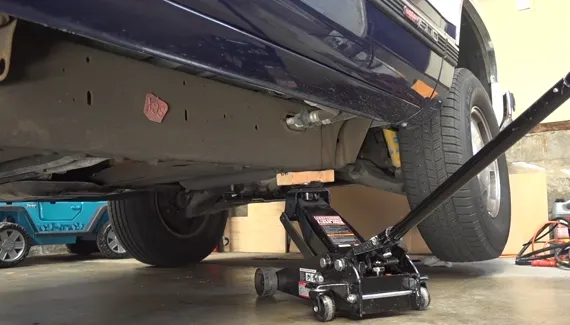
Floor jacks are an essential tool for anyone who works on vehicles. They provide safe access to the underside of vehicles by lifting them off the ground. If floor jacks are not used correctly, they can be dangerous. It is vital to act quickly if you discover that the floor jack leaks.
A leak left unchecked could cause serious damage to your jack and make it unsafe to use. The hydraulic pressure in a jack can be lost if a leak occurs, resulting in the vehicle falling. A serious injury or death can result from this.
Also, if the jack is unable to support the weight of the vehicle, it may collapse, resulting in property damage. If you discover that your jack is leaking, you should first turn it off. Do not attempt to move or repair the jack while it is still under pressure.
As a precaution, always use a jack stand when working on a lifted vehicle. These will support the vehicle’s weight in case of a jack failure.
Is It Better to Repair or Replace a Floor Jack for Your Jeep Wrangler?
Repairing your floor jack can save you money in the short term. If your floor jack is not very old and only needs minor repairs, it might make sense to invest in fixing it.
However, if your floor jack is old and needs significant repair work, you might end up spending just as much money as you would on a new one. If your floor jack is damaged and unsafe to use, repairing it is not viable. In most cases, replacing your old or damaged floor jack with a new one is the best action.
Our blog takes your Jeep Wrangler’s safety and maintenance seriously. Therefore, we have listed the best floor jack for jeep wrangler with essential features and functionalities. Our blog contains detailed descriptions of each floor jack, including its lifting capacity, safety features, portability, and durability.
Why Does the Hydraulic Jack Not Stay Up?
There are a few possible explanations if your jack isn’t staying up. Hydraulic fluid leaks or low fluid levels are common causes. Depending on the fluid level, air can enter the system and cause the jack to fail. Damaged valves or seals could also be the cause of the problem.
This can cause hydraulic fluid to leak out, again leading to air getting into the system. There’s also a possibility that the pump in the jack is damaged or worn out. If it can’t generate enough pressure, the jack will fail to stay up.
It can also fail to stay up if you overload the jack by lifting too much weight. The jack will not stay up if it cannot generate enough pressure. To troubleshoot these problems, start by checking the fluid levels and inspecting the jack for leaks.
Is It Necessary to Bleed a Leaky Floor Jack?
Yes, it is necessary to bleed a floor jack that is leaking or that has air in the system. This will help to restore the hydraulic pressure so that the jack can function properly. If your floor jack isn’t lifting as high as it used to, or if it’s becoming increasingly difficult to pump, it may be time to bleed the air out of the system.
The process is relatively easy to do at home with the right tools and a bit of knowledge. You’ll need to locate the bleeder valve, which is typically located near the unit’s base. Open the valve and pump the jack until fluid flows from the valve once you’ve found it.
At this point, close the valve and check the pressure in the jack. If it’s still low, repeat the process until you’ve achieved the desired pressure level. Bleeding a floor jack is essential to keeping it in good working condition and ensuring that it will continue to provide years of service.
How Do You Replace an O Ring on a Floor Jack?
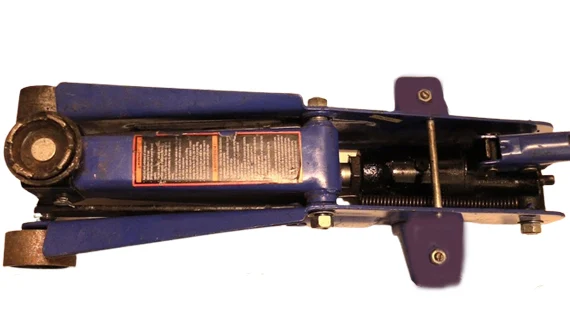
Replacing an O-ring is a relatively simple process that anyone can do at home with a few tools and a little bit of knowledge. O-rings are integral to the proper functioning of floor jacks. These small rubber seals keep hydraulic fluid from leaking out of the jack.
Over time, O-rings can become damaged or worn out and need to be replaced. It is first necessary to locate the O-ring that needs to be replaced. Then you will need to remove the old O ring from the groove in the floor jack. This can be done with a flathead screwdriver or a utility knife.
The O-ring should then be lubricated with hydraulic fluid. This will help to ensure a proper seal. It’s then time to put the O-ring in the jack, and the unit should be reassembled. Once your floor jack has been reassembled, wipe away any grease and replace the O ring. That’s all there is to it.
How Do I Find the Floor Jack Release Valve?
The release valve is usually located on the power unit, which is the part of the jack that you pump up in order to raise the load. Most floor jacks have a release valve that allows them to be lowered slowly and safely.
The valve screw must be turned counterclockwise to release the jack. Once the screw is loose, you can press down on the handle to release the pressure and lower the jack slowly. If your floor jack does not have a release valve, you can lower it by detaching the power unit and letting it drain.
Is It Okay to Use Motor Oil In Hydraulic Jacks?
In an emergency, motor oil can be used as a temporary solution. If you are using motor oil, make sure it is 10/20W lightweight. Heavy oils could damage the jack’s seals, so try to avoid them.
The right type of hydraulic jack oil is essential if you’re using a hydraulic jack. Using the wrong fluid with hydraulic jacks can cause problems. There are specific fluids that these pumps are designed to work with.
Now that you know more about floor jacks, you will be in a better position to maintain yours for a long time.
